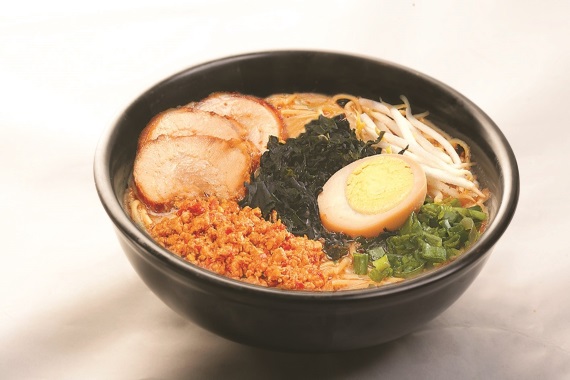|
|
What Does Japan Foods Holding Do?
Unless you are a serious investor, chances are that you would be more familiar with the food brands that Japan Foods Holding operates rather than the company itself. The Group’s extensive list of franchise brands includes popular Japanese ramen brands Ajisen Ramen and Menya Musashi.
The company also has its own self-developed brands such as Japanese Gourmet Town at Vivocity and Dutch Baby Café at Paragon. In total, Japan Foods Holding currently has 51 self-operated restaurants and food court outlets in Singapore.
# 1 Invest In Companies With Their Own Unique Capabilities
The F&B sector is a tough environment to be operating in. Every other week, a new Japanese restaurant opens in Singapore and the foodies will flock over to get a “first bite” of the food.
Japan Foods Holding, and in particular, their flagship brand Ajisen Ramen, is synonymous with Japanese Ramen in Singapore. In fact, what many foodies probably do not know is that Mr Takahashi first brought Ajisen Ramen into Singapore 20 years ago, long before Japanese Ramen became a mainstream food choice in Singapore.
These days, Japanese Ramen is far more popular and competition is a lot higher. Many have come and gone but the Ajisen Ramen brand has held a firm position in Singapore’s newfound ramen culture. This is a result of the company’s strong focus on ensuring that the quality of its food remains consistent in all 17 Ajisen Ramen outlets even as the brand expanded. With an engineering background, Mr Takahashi himself pays close attention to the process of how food is prepared so that consistency can be attained.
|
“The company has the know-how on how to prepare various types of Japanese cuisine that has been gleaned from working with different brand owners over the years. Every time it secures a new franchise brand, there is a transfer of technology and knowledge.” - Timothy Ho |
Beyond food quality, the company also has an advantage with its portfolio of food brands, which enables it to perform what it calls “restaurant portfolio management”.
This allows them to try out different strategies at malls across the island.
For example, when the company first opened a café-concept restaurant at Raffles City, it did not do well. But rather than give up a good location, the Group was able to quickly switch to another brand which was a better fit for the location and same-store sales increased.
Another advantage that the company has is the know-how on how to prepare various types of Japanese cuisine that has been gleaned from working with different brand owners over the years.
Every time it secures a new franchise brand, there is a transfer of technology and knowledge.
This increasing expertise has enabled the company to expand on the menu options of each brand to give customers more choices at Japan Foods’ restaurants. For example, the signature item for its Osaka Ohsho brand is Japanese dumplings called gyoza. These days, customers will find gyozas on the menus of the company’s restaurants under other brands such as Ajisen Ramen and Menya Musashi.
In a similar way, when it comes to investing in stocks, investors need to ask themselves if the stock they are investing in has some form of unique capabilities, which their peers cannot easily copy. These added capabilities are what would ultimately help them differentiate themselves in the long run.
# 2 Invest In Stocks That Are Resilient
As an investor, we want to invest in stocks that are resilient. We want the companies to fare well during both good and bad times, and not only when times are good.
In the same way, business owners also want their companies to be resilient when the economy isn’t doing well.
As an F&B company, Japan Foods Holding is somewhat resilient even when the economy isn’t doing well. While Japanese cuisine tends to be slightly pricier compared to local food, Japan Foods Holding ensures that its brand such as Ajisen Ramen do have options available for customers who are more budget conscious.
In fact, its basic ramen, which costs S$7.90, has remained at this price since the company first started operations in 1997, and remains popular with students. This allows the restaurant to cater to different types of customers.
Japan Foods Holding’s resilience also stems from its ability to manage its cost well. From the adoption of technology such as using iPad to take orders, to negotiating long-term leases to keep its rental cost manageable, this helps the company achieve a respectable gross profit margin of 84.8% (as at 9M 2017), one of the highest among F&B companies in Singapore.
Read Also: How Much Does A Bowl Of Ajisen Ramen Really Cost?
# 3 Doing Due Diligence Before Expanding Your Investment Portfolio
An important part of investing would be researching and analysing new companies that we are investing into. Without sufficient market insights, investors would just be punting on stocks in the hopes that they would do well.
In the same way, the process of identifying new food brands to introduce into Singapore requires extensive market research and analysis. Japan Foods Holding gets a sense of what the Singapore market wants by talking to their customers. Once a need has been identified, Mr Takahashi would do further “research” by travelling to Japan to find suitable brands that his company can bring to Singapore.
This is very similar to looking at the market and identifying possible growth areas. Once an investor has done that, they will then identify the right stocks that are best suited to capitalise on this growth.
|
- Warren Buffett (photo) |
# 4 Start Off With Small Investments First
When you invest in a new stock, it’s prudent to start off with small investments first.
This allows you to get a feel of the stock, understand its operations, and know its management better before you consider putting larger investments into it.
In the same way, new brands that Japan Foods Holding brings in would be tried in just one or two outlets first. Once the concept is proven, the company will then expand the brand into more outlets.
Investing Is Not That Much Different From Grooming A Business
To sum it up, our conversation with Mr Takahashi reminded us that as retail investors, our investments into stocks should not be based purely on just financial figures. We also need to take the time to look at a company, its vision, its management and growth prospects.
This article is republished with permission. All opinions expressed in this article are the independent views of DollarsAndSense.sg



 “I never attempt to make money on the stock market. I buy on the assumption that they could close the market the next day and not reopen it for five years.”
“I never attempt to make money on the stock market. I buy on the assumption that they could close the market the next day and not reopen it for five years.”




